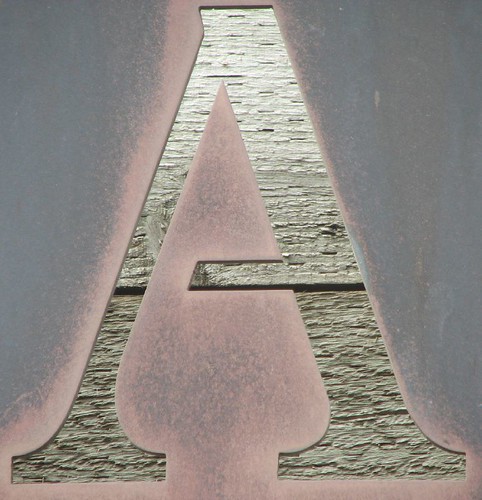She sounds current, a mix of all those stylish A- names plus Luna and Lucy.
Thanks to Michelle for suggesting Aluma as our Baby Name of the Day.
If not for Michelle’s hint, I might have dismissed Aluma as invented. She was given to fewer than five girls in the US last year – which means possibly none – and doesn’t appear in some of the more reputable baby name guides.
But Michelle suggested Aluma was Hebrew, so off I went to check Kveller’s lists. Nope, not there either. How about the lovely and knowledgeable Hannah Katsman, the blogger behind A Mother in Israel?
Score.
There, in an old thread, is a reference to Aluma. As regards the meaning, the commenter said: “no, not bundle of wheat, but a ray of light.”
Names that mean light or bright or clear are huge for girls. There’s Alba, profiled just yesterday. Aluma reminds me of alumbrar – a Spanish verb, usually translated as “to light” or illuminate. The English verb illuminate was borrowed from Latin illuminatus; a similar word also came to English via French from the Latin. I can’t confirm that Aluma has anything to do with alumbrar, but girls’ names with similar meanings are found in nearly every language.
So Aluma could be a harvest name, or possibly another glowing girl. Or the third explanation is that Aluma simply means young girl or maiden. That puts her in the same camp as Talitha and Colleen. The only problem? The Hebrew word for maiden is usually given as almah, and while Alma has quite a bit of history as a given name, it is pretty clearly linked to 1854’s Battle of Alma, when the French and English forces defeated the Russians. I must be missing something in the Hebrew – the plural is alamot and the root is elem – so perhaps there is some logical way that Almah and Aluma are connected. (Anyone have a thought on this? It has me stumped!)
Lastly, Aluma is a place name in Israel and also Oklahoma.
Regardless of her origins, Aluma is rare but not unknown. She pops up in US Census records pretty steadily. The years right around 1900 were a great moment for Lu- and Lou- names. On the girls’ side alone, there’s:
- Familiar names that would be right at home in 2012, like Lucy, Lula, Lucille, Lucile, Luella, Lulu, Lucinda, Lue, Lucia, Luna, Lucie, Lucretia, Louise, Louisa, Lou, Louella and Louie.
- Lura, Ludie, Luvenia, Lutie,Luvinia, and Louvenia.
- Guadalupe and Lupe.
And then there are rarities like Ladusky, based on the Lou- names, but not recognizable to the modern eye. Names like Aluna and Iluma surface in the US Census records, too.
So what is Aluma? A creative invention from the nineteenth and early twentieth centuries, assembled from appealing sounds of the day? Or a legitimate Hebrew rarity? I suspect the answer is both. Back to A Mother in Israel for comments about current trends: “a lot of creative , innovative naming of kids,” notes one grandfather. “This has been the case for a good stretch of Jewish history where we have tended to be more flexible/creative with girls names …” writes another.
Aluma’s meaning might be a little uncertain, but her place as a given name is not. She’s a rarity that has found favor with some over the years, and her sound could be right at home in 2012 again.





Thanks for the compliment and for spelling my name right–but I guess that’s your business. 🙂
For the record Israelis are much less willing to invent names than Americans. There are exceptions but the overwhelming majority of Jewish Israeli names are Hebrew, even though some of the choices may be slightly odd.
This one’s gorgeous — I was just commenting on Lumi somewhere else, and this would be a really nice way to get that as a nickname.
I think Aluma is gorgeous!
In Spanish, the verb “alumbrar” has many interesting variants — the noun form “alumbramiento” actually means labor or “the birth”. “Dar a luz” (or, literally, “to bring into the light”) means “to give birth”.
I guess it’s kind of pretty, but to me it makes me think of aluminum, especially the foil, which is not the greatest association. But it seems like a nice, different choice for those looking for a unique, Hebrew name.
Yep, Aluminum. Well that and Lumen Pierce from Dexter.
Argh, I wrote a long post & then my laptop crashed…>:-( Okay, with my limited knowledge of Hebrew:
Aluma spelled with an aleph does mean “sheaf, bundle” and is used as a harvest name. Good article discussing this word: https://www.balashon.com/2009/05/aluma.html
Aluma spelled with an ayin means “young girl.” This is also a transliteration of “youth” [i.e. when a person is young] in several places in my Tanakh, but it’s definitely not the only word with that meaning. As far as I know these are from the same elem/alma root, with elem meaning “young boy” and alma meaning “young girl.”
I haven’t found anything that says Aluma has a meaning related to “light” in Hebrew. There were several other errors I noticed in those comments, so I’d take them with a grain of salt.
Alumim with an ayin means youth, and is related to Alma meaning a young girl or maiden. Alumim has a plural form but no singular. The feminine singular would theoretically be Aluma with an ayin, but the usage doesn’t exist. Our concordance did not have any examples of Aluma with an ayin. Alma is popular now here in Israel.
Our dictionary had a couple of definitions of Aluma with an aleph as a trajectory, but no mention of light (even though my daughter and husband both were aware of this meaning). This popular Hebrew site lists both definitions–bundle of wheat and ray of light. https://www.shemli.co.il/hebnames/name_details.seam?nameID=2929
My original source about the ayin Aluma was The Complete Dictionary of English and Hebrew First Names by Alfred J. Kolatch.
Thank you, Hannah! I really got lost on this one.
And Frederick, Spencer, Guthrie, Hollis, Clinton, Arnett, Gage, Cordell, Marlow, Noble, Dewey, Perry, Helena…
More Oklahoma place names! My theory is that Oklahoma is full of interesting names to our 2012 ears because it was settled largely in the 1880s-1910s, and the place namers were using named from that era. Alva is another Oklahoma town, which is probably related to yesterday’s NoTD. Enid, Ada, Hugo, Idabel, Norman, Edmond, Davis, and Duncan could all be fashionable choice today.
I’m not very familiar with Hebrew…but isn’t it written without vowels, only consonants. Which leads to a lot of variant spellings (and possible meanings) when vowels are added back in. Aluma & Almah would both contain the same consonant routes…LM(H?). I’m not sure but that could be the source of the variation.
Actually no, Katie. It’s complicated. 🙂 Almah is with an ayin, pronounced silently in modern Hebrew unless you are Yemenite. Alumah is spelled with an aleph. There is no etymological connection.
Interesting name with a pleasant sound (although I confess that at first glance I read “alumni”). I’m a bit confused by your comment on the Battle of Alma. I’m sure it helped to popularise the name, but Edmund Spenser had already used Alma in The Faerie Queene. Of course, that doesn’t do anything to clear up what ties there might be between the Hebrew word almah and the elusive Aluma.
I’ve never met an Aluma, and the only Alma I’ve ever known was from Afghanistan. The bit of research I’ve done shows me that Alma features in a number of Afghani place names, but I’ve drawn a blank when searching for the word’s etymology or meaning in the region.
Al-ma means “the water” in Arabic [which, of course, is a rare & precious commodity in the desert]. 🙂
Ahh, thanks! I was thinking last night as I went to bed I should have looked for a translation specifically in Arabic. I’d been dumb, and when adding specificity to my search had looked only for Dari and Pashto.
Alma is also a Tatar name meaning, “apple”, this is where the place name in Russia hails from. As Panya mentioned, it is also the Arabic word for “the water.” However, Alma was a popular female name throughout Central Asia, being a derivative of the Turkic word for apple. It is a common female name in Kazakhstan, Uzbekistan (spelled Olma) and among ethnic Tatars in Russia. Its usage in Afghanistan may also have something to do with its Central Asian origins.